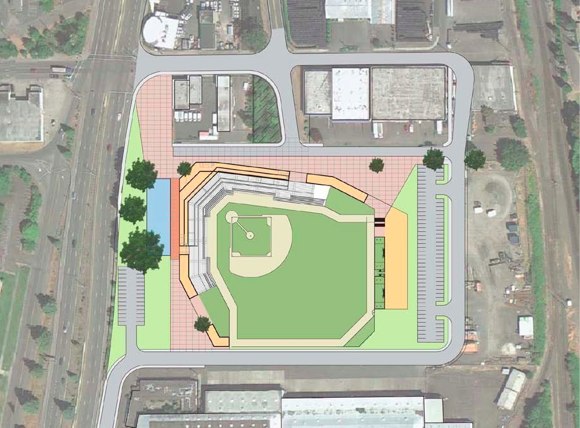
No surprise: Milwaukie (Ore.) officials decided to walk away from a ballpark deal for a West Coast League team after city officials couldn’t determine the economic impact of such an investment.
We predicted this would happen. The reasons are pretty obvious.
When a Minor League Baseball team walks into a community, it has a host of economic metrics designed to persuade local political leaders that an investment in a new ballpark is a solid investment. Whether or not you agree with the premise, many professionals have indeed studied the issue and can share those findings. Add to that the fact that it’s been a long time since an MiLB team walked away from a ballpark with outstanding debt, and you have a situation where a MiLB ballpark can be economically justified.
But those metrics just don’t exist in the summer-collegiate world. Truth be known, there’s never been the need for them: typically teams are competing with town and Legion ballpark for the use of an old ballpark, and economic impact isn’t a factor when a team is negotiating a lease with the local park and rec director. There have been very, very few new ballparks built for summer-collegiate teams, and the ones we can recall in the last 10 years — like Kapco Park, home of the Lakeshore Chinooks, or Copeland Park, home of the La Crosse Loggers — were built for under $2 million. In both those cases, a new ballpark was built largely through the largess of others, so an economic-impact study was never necessary.
So it’s no surprise Milwaukie officials couldn’t come up with numbers outlining the economic impact of a new ballpark for a summer-collegiate team: they simply don’t exist, and when you look at the money generated by a summer-collegiate team, it’s not enough to cover $10-$12 million for a new ballpark. From the Oregonian:
Community Development Director Kenny Asher said despite a strong effort to get the numbers on how much money would be generated by a team and stadium and the jobs the project would bring to the city, he didn’t have that necessary information for the council Tuesday night.
“It was a lot to try and do in 10 days and we were hustling toward that,” Asher said. “But we don’t have the numbers for that tonight.”
And with that, the City Council formally killed any possibility of a new ballpark in Milwaukie.
RELATED STORIES: Milwaukie has week to decide ballpark fate; Milwaukie to study impact of summer-collegiate baseball; West Coast League to Milwaukie? Highly unlikely; Milwaukie: We expect ballpark deal by end of July; Debate continues: Can Portland support two short-season team?; Milwaukie, Northwest League discussing team, ballpark; Hillsboro approves offer sheet to Yakima Bears; Hillsboro set to vote on new ballpark; Milwaukie will delay decision; Milwaukie advances, Hillsboro retreats in Portland-area ballpark race; Yakima County: We’ll discuss ballpark upgrades; Plan B for Bears: Work on Yakima ballpark plan; Admissions tax voted down in Clark County; Milwaukie seeks public input on new ballpark; Milwaukie moves ahead with ballpark-feasibility study; Clark County postpones ballpark hearing; County scales back commitment to Portland-area ballpark; Competing ballpark plans in Portland; New Portland-area ballpark could provide economical bump: study; Clark County reverses course; will exclusively negotiate with Bears; Clark County passes on exclusive negotiations with Bears; opposition to new ballpark rises; Funding plan emerges for new Clark County ballpark;Yakima Bears to Portland area
—-
Share your news with the baseball community. Send it to us at editors@augustpublications.com.
Are you a subscriber to the weekly Ballpark Digest newsletter? You can sign up for a free subscription at the Newsletter Signup Page.
Join Ballpark Digest on Facebook and on Twitter!
Follow Ballpark Digest on Google + and add us to your circles!
